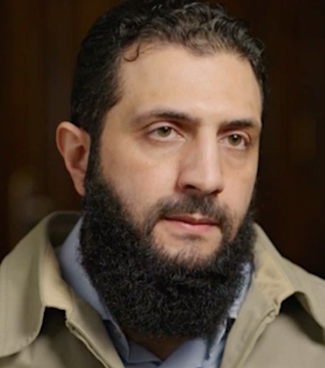Syria’s Jihadist Rulers Use Taliban Playbook to Obscure Reality

Jolani
Michael Hughes
December 20, 2024
The terrorists now ruling post-Assad Syria have publicly vowed to abandon their extremist ways in a bid to secure funding and legitimacy from the international community – in addition to the easing of sanctions. The statements sound eerily similar to those that emanated from Taliban 2.0 as the radical movement recaptured Kabul. Which raises the question: Does anyone believe the new occupiers of Damacus – a group led by members of al-Qaeda and the Islamic State – are suddenly interested in moderate reforms? At least one thing is certain: the Western media is ready and willing to support the rebranding process.
Syrian leader Abu Mohammed al-Jolani, a designated terrorist, in an interview with The Times of London tried to address concerns that his organization, the Hayat Tahrir al-Sham (HTS), would impose sharia law throughout the country.
“It will be the natural Syria,” Jolani said. “I think Syria will not deeply intrude on personal freedoms.”
However, Jolani also slyly allowed for a loophole by indicating “customs” would have to be taken into consideration. And we all know what these “customs” look like. Jolani told the BBC he believed in women’s education and refuted the notion that he wanted to turn Syria into Afghanistan. When pressed about alcohol consumption, Jolani said, “there are many things I just don’t have the right to talk about because they are legal issues.”
Throughout the interview Jolani tried to send a message of reassurance that HTS and its ilk would rule differently than they have behaved in the past. BBC’s Jeremy Bowen bluntly stated that many Syrians simply do not believe Jolani. The Times interviewer, Samer Al-Atrush, aptly observed the shock that potentially awaits Syrians who grew comfortable with a lifestyle that is anathema to radical jihadists.
“[Jolani] will struggle to convince skeptical western countries, and Syria’s religious minorities, that he and his HTS group will not seek to impose strict Islamic law in a traditionally secular country where alcohol flows freely in restaurants and bars and women dress relatively liberally compared with others in the region,” Al-Atrush wrote.
The mainstream press has shamefully used the risible label “rebels” to describe HTS and the other extremists that have ousted Assad. Of course, the U.S. and western media have deep experience in helping radicals in conducting public relations campaigns. During the anti-Soviet jihad, Washington successfully convinced a surprising number of people that the Afghan mujahideen were “freedom fighters.”
Jolani, for his part, founded al-Qaeda’s affiliate in Syria – the Nusra Front – and worked closely with ISIS leader Abu Bakr al-Baghdadi in expanding the terror faction’s reach across the region.
“We deputized al-Jolani, who is one of our soldiers, with a group of our sons, and pushed them from Iraq to Syria to meet with our cells in Syria and set for them the plans and drew for them the policy of work,” al-Baghdadi announced on April 2, 2014 regarding the founding of Nusra Front.
In 2016, a faction that became a part of Jolani’s group, Nour al-Din al-Zenki, beheaded a Palestinian boy who was allegedly around 12 years old. The allegations came as videos went viral showing the horrific incident. Jolani, however, sees these missteps as a bad “phase.”
“I believe that everyone in life goes through phases and experiences… As you grow, you learn, and you continue to learn until the very last day of your life,” Jolani said in an exclusive interview with CNN, as if referring to some minor one-off escapades.
The press has gone to appalling lengths, already, in reframing the terrorists, as Alan MacLeod in a piece for MintPress News observed. The Daily Telegraph called Jolani a “moderate jihadist,” while The Washington Post characterized him as a charismatic and pragmatic leader. According to CNN, Jolani is a “blazer-wearing revolutionary.” Quite a different take from 2013, when the network ranked Jolani among the world’s 10 most dangerous terrorists.
The odds are quite high, of course, that Washington will at some point throw its support behind the new Syrian regime so long as American interests are satiated. In fact, they already have. The child-beheading al-Zenki “freedom fighters” received U.S. military support, including anti-tank missiles, until 2015. The State Department condemned al-Zenki’s “barbaric” actions at the time, but claimed the U.S. does not comment on which groups are funded by the United States. In other words, yes, the U.S. funded a child-beheading jihadist group for years.
MacLeod predicted Jolani will have sanctions lifted quite swiftly, a likelihood he put into a larger perspective.
“The U.S. refused to remove Nelson Mandela from its list of the world’s most notorious terrorists until 2008 – 14 years after he became President of South Africa,” MacLeod wrote. “In comparison, Jolani’s redesignation might take fewer than fourteen days.”
Al-Baghdadi would certainly be quite proud that his lieutenant and fellow jihadists finally have their grip around Damascus, and the opportunity to reshape Syria into the caliphate they’ve long dreamed of. And, Jolani and his colleagues will have the Taliban to thank for providing the blueprint.
